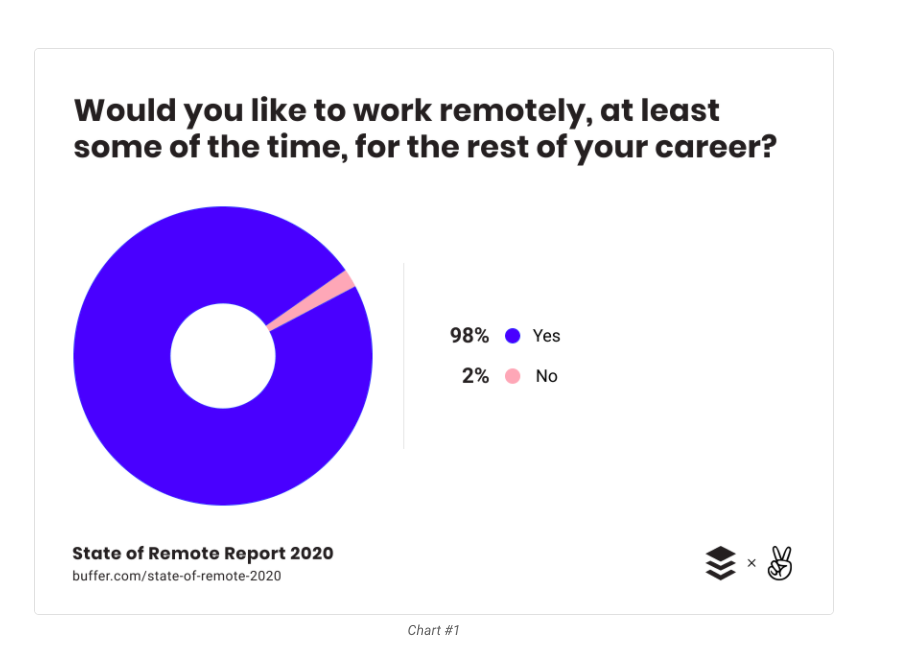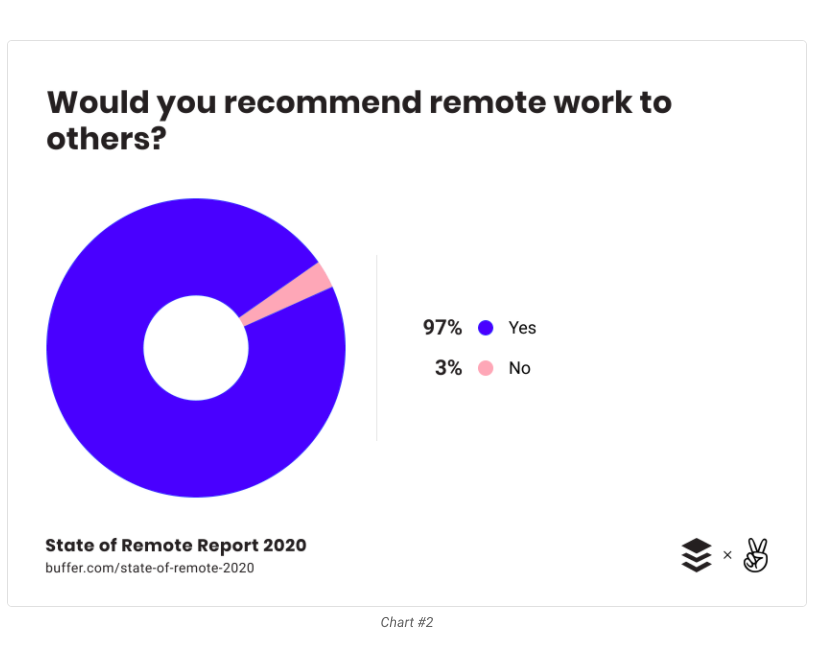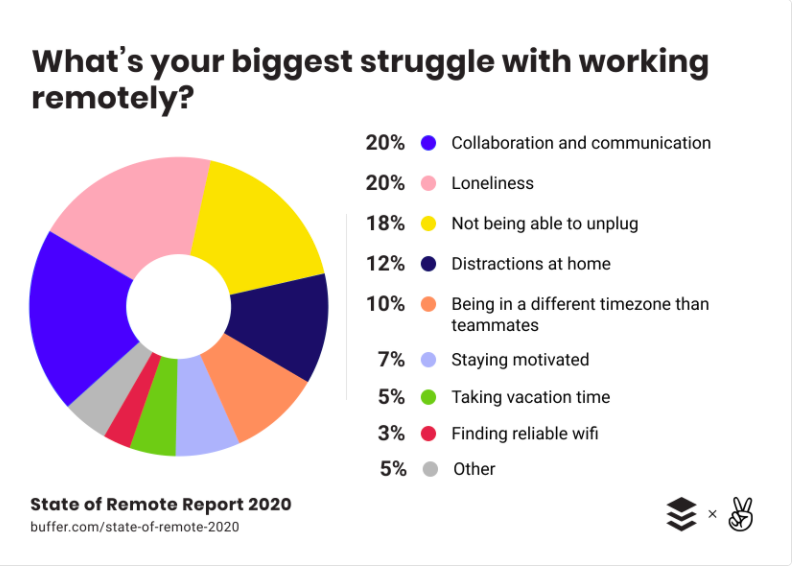
Remote Work in the IT Industry: List of Benefits and Best Practices
Every cloud has a silver lining, but in the COVID-19 pandemic disaster, it is really difficult to find any silver lining. But again, if we intend to find a way, and this we can witness in the IT industry. The growth of remote working IT culture can be seen as the biggest unseen benefit of COVID-19.
The pandemic has led every IT company in the world to shift to remote working. Even the dedicated opponents of remote working hired remote developers during the COVID-19 pandemic to sustain their IT business.
There was a huge section of the population who always supported the remote working culture even before the pandemic. There is Definity about one thing: remote working is possible and possibly the most feasible in the IT world and it can be continued like this for a long time, if not forever.
Tech giants adopting remote work culture

The remote work culture is at its peak, and all IT leaders have already started leveraging the benefits of hiring offshore development teams. Let’s have a look at how these tech giants are employing remote work culture in their organisation.
According to Washingtonpost.com, Twitter announced that the majority of its employees will be able to work remotely forever.
Facebook founder Mark Zuckerberg announced to move half of its Facebook operations remotely in the span of 5-10 years. He also stated that Facebook is aggressively looking to hire remote workers.
Hubspot
HubSpot’s Director of Acquisition Matthew Howells-Barby said in his team that they have already started to work in remote environments. And as per his statement, it worked wonders and really well for them.
Coinbase
Coinbase announced in May that they are adopting a “remote-first” policy for their company.
Shopify
Popular e-commerce provider Shopify said most of its employees will work from home in 2025.
Top benefits of remote working based on research
Remote working and its benefits are not just based on assumptions. These are proven with studies, surveys and data. The data clear your doubts on how outsourcing app development can prove beneficial.
- Increased productivity
Leaders and workers are skeptical about remote work as they think its practice is unproductive since there are numerous interruptions and no supervision. Though these points are somewhat valid, they still fail to paint the complete picture.
Remote working comes with flexibility and convenience, which remote sources greatly value. They cherish this so much that workers are willing to work for extra hours at night and even on the holidays to compensate for wasted time.
The above claims are not baseless but as per a survey conducted by CoSo cloud on remote resources, the following were the results
Around 23% of employees said they are willing to work longer to complete their work.
52% said they are less likely to take off.
30% of employees were able to accomplish more in less time.
77% of employees confirmed increased productivity and remote working.
All these stats prove that outsourcing or hiring remote workers is a successful model to extend a team.
- Cost-efficient
Remote work turned out to be a boon for startups and companies that work on tight budgets. Remote working has proved to save an enormous amount of money. Let’s look at some facts and check how cost-efficient remote working turn up to be:
Say if you are looking to rent an office, it may cost you somewhere around $100 per square feet. This cost doubles if you look for a prime location.
So if you have got a team of 60 members, then at least you will need an office space of 7000 square feet and that each member will need 100 square feet along with reception, lunchroom, meeting room, storage, etc.
So if you take the average rent of $75 per square feet then it will cost you $450,000 per year. And along with this, if you add more supplies such as furniture, computer systems, utility bills and maintenance, then the total cost will reach somewhere around $600,00 per year.
This way, you can save $600,000 per year through remote work. As per a report by Global Workplace Analytics, startups and businesses can save up to $11000 per person a year with remote work.
If we look at the second aspect, hiring remote developers is cost-efficient and you can hire developers at affordable rates.
Many IT companies are leveraging the benefit of hiring offshore remote developers from developing countries like Asia and South America. The below chart shows the minimum and maximum hourly rates of remote developers across various regions in the world.
- Healthier remote resources
For all the resources working in the IT industry, health is an emerging concern. The sedentary nature of work causes serious problems among developers due to long hours of sitting.
Obesity, diabetes, high blood pressure, and high cholesterol are increasing among developers. And as per the study, office workers are more prone to alcohol abuse, obesity and physical inactivity.
Office workers are highly susceptible to contagious diseases and spread germs and viruses. We live in a pandemic and working in an office is nothing less than a grave danger.
Even people who work in an office take more sick leaves than remote workers.
By adopting a remote working culture, companies can ensure the resolution of issues. Remote work benefits developers as it frees them from sitting in a chair for long hours. And most importantly, it eliminates the fear of transmission of contagious diseases and third, it saves long commuting hours.
- Exhibit better collaboration
The major reason why employees refrain from adopting a remote working culture is that they fear a seamless collaboration. Well, the reality is poles apart.
As per study, around 81% of remote workers have stated that their communication with their colleagues improved. The remote workers complaining about poor communication are less than 3%.
Another major drawback of office work is that developers tend to indulge in random conversations with coworkers. Remote work will easily dodge such distractions.
- Show more loyalty
Employee retention and satisfaction increase with remote work. Offshore resources are 13% more likely to stay at a job than work on-site.
This is the reason companies offering remote work facilities have 25% lower employee turnover rate than the ones who don’t offer. Additionally, 74% of people favoured companies that are providing remote work. Another study shows a steep drop of 50% in employee turnover when employees were asked to work from home.
Not providing flexibility has proved costly to employees, and around 62% of employees left their jobs because they lacked flexibility. 79% of employees stated they would be more loyal to their company if they provided a flexible work culture.
Best remote work practices for software companies

Reap the maximum benefit by employing best remote work practices. Here are the top remote work practices.
Progression monitoring
Remote work comes with its own challenges. For eg one is you expect remote workers to be online on a consistent basis. Well in this case you can ask them to inform them while they leave or come back to work. Using sophisticated methods of monitoring, you can refrain from monitoring all moves. Create a structure and plan the entire work with a proper task tracking system that can be accessed from their computers. Try to schedule timings of every progress meeting and review all employee tasks and monitor their progress.
In a remote work environment, it is very important to organize work and help employees rather than just making decisions.
Provide a home office budget for proper functioning
When you establish a remote work environment, provide developers with a proper set of tools as your engineers might have their personal computers at their homes. There is a high possibility that it might not meet security standards. Enable developers to carry their work station to their office, home or business trips. Initially, laptops will cut into the budget and will payout in future.
Other than laptops, you can provide engineers with a fixed budget for home office equipment and this will help employees buy quality equipment that will enhance productivity and maintain employee health.
Maintain effective communication through socializing and documentation
Just through emails, maintaining effective communication is a bit difficult. Establish seamless remote communication and set up channels for instant file transfer and real-time chat. The right tool helps your employees to reach each other effectively and efficiently. The communication tool should support video conferencing features and when employees see each other it creates a sense of community and eliminates feelings of seclusion. Try to involve employees in video chat conferencing for casual socializing and this can prove a big help in team building.
Expand talent pool through remote work
One of the best advantages of remote working is it provides access to a much bigger pool of candidates. Remote work attracts job applicants with children and family and they look for companies who allow them to take longer breaks to manage family matters.
Remote work also attracts candidates who live far away from office locations or abroad. In this case you must consider the time zone difference.You have access to quality candidates across the globe.
How Companies Are Thinking About Remote Work in 2020
Business Owners: Did you always intend to support remote work?
- 87% Yes
- 13% No
Employees and Business Owners: What is your workplace’s stance on remote work?
- 43% Part of the team is full-time remote and part of the team works out of the same office.
- 30% Everyone at my company works remotely
- 15% At my company we can work from home as needed
- 9% At my company we can work remotely a certain number of days per week/month
- 3% I am a solo business or freelancer and work remotely
Employees and Business Owners: How many full-time employees does your company have?
- 26% 11 to 50
- 18% Fewer than 10
- 17% More than 1,001
- 16% 101 to 500
- 13% 51 to 100
- 7%501 to 1,000
- 3% Just me
Employees and Business Owners: What percentage of your company works remotely?
- 33% 1 to 25%
- 28% 100%
- 19% 26 to 50%
- 11% 51 to 75%
- 9% 76 to 99%
Source: https://lp.buffer.com/state-of-remote-work-2020

Wrapping up
Remote work just didn’t come into the scene because of the pandemic. It was there before but was never hyped or preferred. COVID-19 played a huge role in the growth of remote work culture.
It turned out to be a cost-efficient, global, and modern alternative as compared to office work culture. It proved a cost-efficient, global and modern alternative in comparison to office work culture. This is the reason why IT companies are actively looking to outsource mobile application development and software development.
The remote work trend brought wonders in IT work culture and surprised everyone with positive aspects. We should not be surprised if we see a large percentage of IT companies continuing remote work even after the pandemic. Let us know your views about remote work culture and if we missed adding some important points.
Related Blogs-
6 Key Skills For Scrum Masters
Top 10 Tech Skills To Learn 2024
What Is Visual Positioning System Vps A Complete Technical Guide
Svelte A Guide To The Framework With No Framework